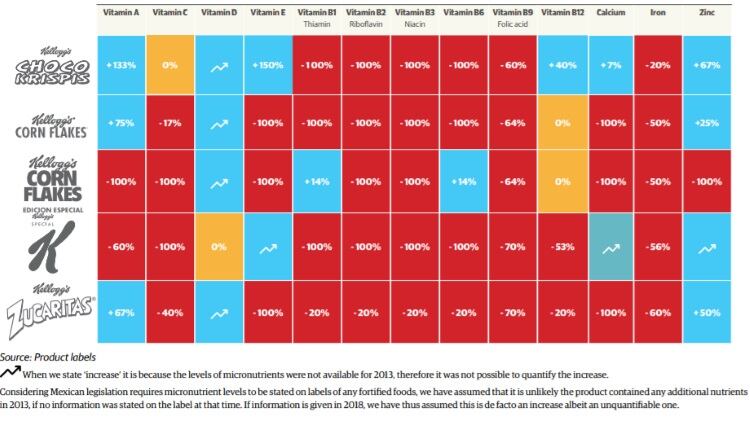According to the Food and Agriculture Organization (FAO), the number of undernourished people in Latin America has doubled year-over-year since 2015.

Additionally, the Mexican national health survey reported that one in four children under five suffer from anemia (an iron deficiency), a quarter do not get enough folic acid and vitamin A through their diet, while half do not get enough iron and calcium.
However, according to the Changing Markets Foundation, SumOfUs and Proyecto Alimente, a look at the Kellogg’s cereal ingredient labels sold in Mexico over the past five years has allegedly revealed that levels of fortification have decreased – by as much as 70% in some instances.
Cereal influencer
Kellogg’s is a market leader in Mexico, with four of the top five biggest-sellers, a ‘cereal’ influencer, you could say, when it comes to what Mexican parents should buy for their children.
Breakfast is an important meal in that country, with 37% of children between the ages of three and 12 consuming cereal daily, while 50% eat it at least twice times a week.
The consumer watchdogs’ report purports Kellogg’s Frosted Flakes – known as Zucaritas in Mexico – had folic acid levels reduced by 70% over the last five years, and Kellogg’s Corn Flakes halved iron levels, while calcium fortification was removed entirely from both of these popular cereals.
A number of other cereals apparently saw significant decreases in iron and calcium.
The report elaborates further that variation in levels of micronutrients is not only confined to differences between Kellogg’s cereal brands; it seems that differences in nutrient levels can be highly pronounced even within the same core brand. For example, a 30g portion of chocolate- or vanilla-flavoured Special K contains 35% of the RDA of B12, whereas the same amount of Special K Cosecha Roja only contains 11%.

“Malnutrition is a critical issue in Mexico, where one in four children suffer from anemia – often caused by iron deficiency,” said Jamila Brown, communications director of international consumers group SumOfUs.
“It’s outrageous that key nutrients like iron and vitamins B, C and E have dropped. Parents believe the promises companies like Kellogg’s make about nutritional value, and it’s time Kellogg’s lives up to those promises and address malnutrition.”
Declarations of good intent
Nusa Urbancic, campaigns director at Changing Markets Foundation, added, “Despite Kellogg’s accolades and declarations of good intent, we were shocked to realise that the company has been quietly removing key vitamins and minerals from its most popular cereals in Mexico.”
The Battle Creek, Michigan-headquartered company has publicly committed to tackling the global challenges of food security including undernutrition, hidden hunger and obesity in middle and low-income communities across the globe.
It has also claimed to have addressed nutrition shortfalls and had improved Latin American cereals with the right amounts of vitamins and minerals essential for children’s growth and development.
In its Kellogg’s Nutrition: Nourishing families so they can flourish and thrive report, the cereal giant outlined the reformulation of its Choco Krispis with calcium and vitamin D to address key micronutrient deficiencies present in Mexican communities.
It states that Choco Krispies provides 25% of the daily recommended intake of vitamin D, as well as 60% more calcium than the other chocolate-flavored cereals on the market.
Rebalanced to comply with regional requirements
In response to the consumer watchdog allegations, Kellogg’s spokesperson Kris Bahner told BakeryandSnacks the company has been proactive and transparent with consumers about the rebalancing of the micronutrients in its cereals, through communication on pack and in advertising and marketing materials.
“Our cereals remain fortified and an excellent source of nutrition for consumers,” she said.
“Studies such as this one – although likely well-intended – can be misleading and often fail to paint the full picture.
“The cereals cited in the report are designed for a Latin America consumer and meet a broader set of regulatory and nutritional requirements across the region. We regularly make modifications to our portfolio to comply with these requirements and rebalance around evolving nutritional deficiencies and needs as communicated to us by regional health authorities and our consumers.”
Bahner noted that Kellogg’s added vitamin D to some of its cereals in 2013, after it was identified as a critically deficient nutrient in Latin American diets in 2011.



